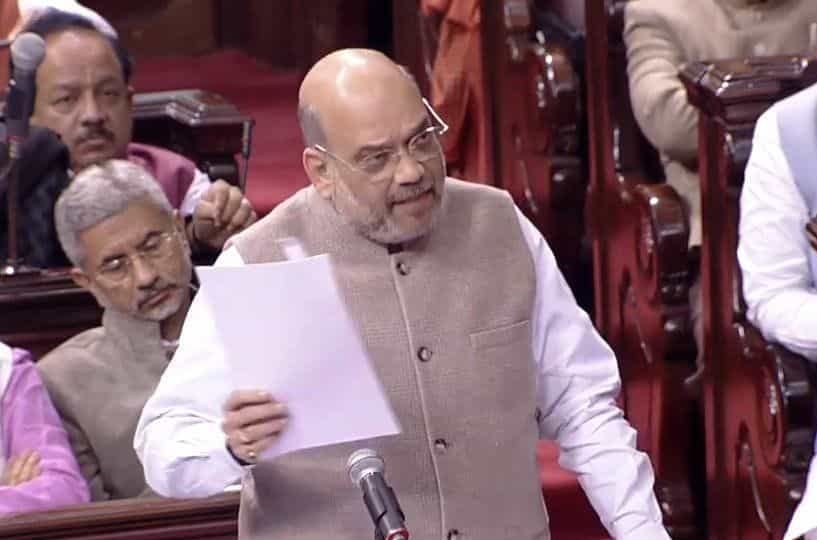
Parliament clears Citizenship Bill, Cong calls it a dark day
The Rajya Sabha on Wednesday passed the Citizenship (Amendment) Bill, 2019 with 125 members voting for it and 105 voting against it. The bill seeks to fast-track citizenship to persecuted minorities coming to India from Pakistan, Bangladesh and Afghanistan.

The Rajya Sabha on Wednesday (December 11) passed the Citizenship (Amendment) Bill, 2019 with 125 members voting for it and 105 voting against it.
The bill seeks to fast-track citizenship to persecuted minorities coming to India from Pakistan, Bangladesh and Afghanistan. The Lok Sabha had already passed the bill.
Prime Minister Narendra Modi said on Twitter that this Bill will “alleviate the suffering of many who faced persecution for years.”
A landmark day for India and our nation’s ethos of compassion and brotherhood!
Glad that the #CAB2019 has been passed in the #RajyaSabha. Gratitude to all the MPs who voted in favour of the Bill.
This Bill will alleviate the suffering of many who faced persecution for years.
— Narendra Modi (@narendramodi) December 11, 2019
Congress chief Sonia Gandhi said the passage of the bill marks the victory of narrow-minded and bigoted forces.
“Today marks a dark day in the constitutional history of India. The passage of the Citizenship Amendment Bill marks the victory of narrow-minded and bigoted forces over India’s pluralism. The Bill fundamentally challenges the idea of India that our forefathers fought for and, in its place, creates a disturbed, distorted and divided India where religion will become a determinant of nationhood,” she said in a statement.
“Today marks a dark day in the constitutional history of India. The passage of the Citizenship Amendment Bill marks the victory of narrow-minded and bigoted forces over India’s pluralism,” said Sonia Gandhi.
Earlier in the day, Union Home Minister Amit Shah took on the Opposition in the Rajya Sabha for questioning the basis of Citizenship (Amendment) Bill, 2019, saying it has corrected a historic blunder.
“I said earlier in the day that Partition was done on the religious lines. The Opposition criticised this statement, so I would like to quote from the April 8, 1950 Nehru-Liaquat agreement (known as Delhi declaration), which said the religious minorities will be given equal rights in both the countries (India and Pakistan) to be part of the government and practice their own religions. These are the claims made by the Prime Ministers of both the countries to their respective religious minorities,” Shah said while replying to the debate on citizenship bill.
Rajya Sabha held a six-hour-long debate on the bill, and voted after the Home Minister’s reply.
During the debate, the Opposition slammed the government for attacking the foundation of the Constitution.
The day began with Shah tabling the bill in the Rajya Sabha with assurance that it will give protection to persecuted minorities from three neighbouring countries. “When Partition happened, it was thought the minorities will get civil rights and lead a normal life, that they will be able to practice their own religion and protect their women. But when we look back, we see what the truth really is. These people did not get their rights. They were either killed, converted or came to India,” Shah said.
Also read: Citizenship law could weaken India’s historic secular character: Bangladesh
But as soon as Shah finished his speech, the Opposition started criticising the government invoking Mohammad Ali Jinnah and Sardar Vallabhbahi Patel.
“It hurts the soul of India. It is against our Constitution and democracy. It fails the morality test. It fails the constitutionality test. It is divisive and discriminatory,” said Congress’s Anand Sharma.
The Trinamool Congress and Samajwadi Party joined the raging debate. “I read that PM said this will be written in golden letters. I will tell you where it will be written; it will be written on grave of the father of the nation, but which father of the nation? In Karachi, on Jinnah’s grave,” said Trinamool Congress’s Derek O’Brien.
Samajwadi Party’s Javed Ali Khan said, “Our government, through this Citizenship (Amendment) Bill and NRC, is trying to fulfill the dream of Jinnah. Remember, in 1949 Sardar Patel had said ‘we are laying the foundation of a truly secular democracy in India’. The country cannot be divided on the basis of religion.”
In between the exchange of these caustic remarks, leaders of different parties kept announcing their stand in favour or against the bill. While the Janata Dal (United) continued its support for the bill in the Rajya Sabha, as it did in the Lok Sabha, the government’s legislation got a boost with the support of All India Anna Dravid Munnetra Kazhagam (AIADMK), YSR Congress and Biju Janata Dal (BJD).


